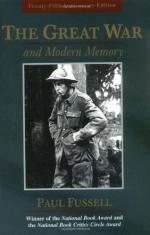
|
| Name: _________________________ | Period: ___________________ |
This quiz consists of 5 multiple choice and 5 short answer questions through Arcadian Recourses.
Multiple Choice Questions
1. In "Exposure," where do the men dream they are?
(a) With family.
(b) Grassier ditches.
(c) Flower garden.
(d) Home.
2. What does the speaker at an elegy become aware of?
(a) His own creativity.
(b) His own empathy.
(c) His own sensitivity.
(d) His own mortality.
3. Where were there two movements that coincided at the time of the Great War?
(a) Scotland.
(b) Germany.
(c) France.
(d) England.
4. The last of the volumes of Siegfried Sassoon's works is called _____.
(a) Siegfried's Travel.
(b) Siegfried's Journey.
(c) Siegfried's Journey Through Life.
(d) Siegfried's Life.
5. In Memoirs of a Fox-Hunting Man, in what year was George Sherson's best friend shot at the front?
(a) 1915.
(b) 1910.
(c) 1920.
(d) 1925.
Short Answer Questions
1. In Memoirs of a Fox-Hunting Man where is the main character in autumn of 1914?
2. During this time, what was considered the main form of entertainment?
3. In the third volume of the trilogy, where is Sherston?
4. Specifically stated in the story, the troops in the trenches felt how?
5. Fussell shows that some words, such as trench coat, stemmed from _____.
|
This section contains 208 words (approx. 1 page at 300 words per page) |

|




